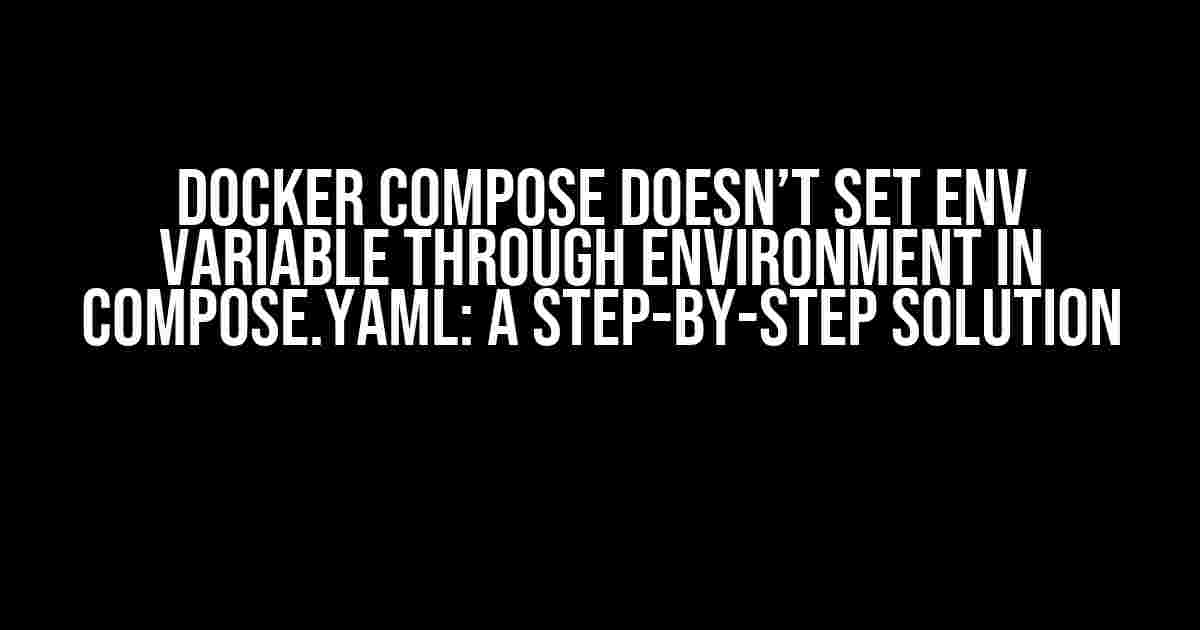Are you frustrated with Docker Compose not setting environment variables through the `environment` directive in your `compose.yaml` file? You’re not alone! Many developers have struggled with this issue, but fear not, dear reader, for we have a solution for you.
The Problem
When you define environment variables in your `compose.yaml` file using the `environment` directive, you expect them to be set in your container, right? But sometimes, they just don’t get set. This can be a major headache, especially when you’re relying on these variables to configure your application.
Here’s an example of what might not work as expected:
version: '3'
services:
myservice:
build: .
environment:
MY_VAR: my_value
In this example, you might expect the `MY_VAR` environment variable to be set to `my_value` in the `myservice` container. But, more often than not, it just won’t be set.
The Reason
The reason for this behavior lies in how Docker Compose handles environment variables. When you define environment variables in your `compose.yaml` file, Docker Compose sets them as environment variables in the container’s build process, not at runtime.
This means that if your application relies on these variables being set at runtime, they won’t be available. Ouch!
The Solution
Don’t worry, we’ve got a solution that’ll get those environment variables set in no time! There are a few approaches you can take, and we’ll cover them all.
Method 1: Using the `env_file` Directive
One way to set environment variables is to use an external file containing the variables. You can do this by using the `env_file` directive in your `compose.yaml` file.
version: '3'
services:
myservice:
build: .
env_file:
- envvars.txt
In this example, we’re telling Docker Compose to read environment variables from a file named `envvars.txt`. This file should contain the variables in the format `VARIABLE_NAME=variable_value`, one per line.
For example:
MY_VAR=my_value
ANOTHER_VAR=another_value
Make sure to create the `envvars.txt` file in the same directory as your `compose.yaml` file.
Method 2: Using the `environment` Directive with the `args` Directive
Another approach is to use the `environment` directive in combination with the `args` directive. This method allows you to pass environment variables as arguments to the Docker image build process.
version: '3'
services:
myservice:
build:
context: .
args:
MY_VAR: my_value
environment:
MY_VAR: ${MY_VAR}
In this example, we’re defining an `args` directive that passes the `MY_VAR` environment variable as an argument to the Docker image build process. We’re then using the `environment` directive to set the `MY_VAR` environment variable in the container.
Note the use of the `${MY_VAR}` syntax to reference the argument passed to the build process.
Method 3: Using a Script to Set Environment Variables
If you need more flexibility or have complex environment variable requirements, you can use a script to set the variables. This approach involves creating a script that sets the environment variables and then executes your application.
version: '3'
services:
myservice:
build: .
command: ["bash", "-c", "setenv.sh && myapp"]
In this example, we’re overriding the default command for the `myservice` container to execute a script named `setenv.sh` before running the `myapp` application.
The `setenv.sh` script would contain the necessary commands to set the environment variables:
#!/bin/bash
export MY_VAR=my_value
export ANOTHER_VAR=another_value
Make sure to make the script executable by running `chmod +x setenv.sh`.
Conclusion
There you have it, folks! Docker Compose not setting environment variables through the `environment` directive in your `compose.yaml` file is a common issue, but it’s easily solvable using one of the methods outlined above.
Whether you choose to use an external file, pass environment variables as arguments, or use a script to set the variables, you can now confidently configure your application with the environment variables it needs.
Remember, Docker Compose is a powerful tool, and with a little creativity and persistence, you can overcome even the most frustrating obstacles.
FAQs
Q: Why doesn’t Docker Compose set environment variables through the `environment` directive?
A: Docker Compose sets environment variables in the container’s build process, not at runtime. This means that if your application relies on these variables being set at runtime, they won’t be available.
Q: Can I use the `environment` directive with other Docker Compose features, like `depends_on` or `ports`?
A: Yes, you can use the `environment` directive with other Docker Compose features. However, keep in mind that the `environment` directive only sets environment variables in the container’s build process, not at runtime.
Q: What if I need to set environment variables for multiple services in my `compose.yaml` file?
A: You can use the `env_file` directive to set environment variables for multiple services by creating a separate file for each service or by using a single file that contains variables for all services.
Q: Can I use environment variables set in the `compose.yaml` file in my Dockerfile?
A: Yes, you can use environment variables set in the `compose.yaml` file in your Dockerfile by referencing them using the `${VARIABLE_NAME}` syntax.
| Method | Description |
|---|---|
| Using `env_file` | Set environment variables using an external file |
| Using `environment` with `args` | Pass environment variables as arguments to the Docker image build process |
| Using a script | Set environment variables using a script that executes before running the application |
By now, you should be well-equipped to tackle the challenge of setting environment variables in your Docker Compose application. Remember to experiment, stay curious, and happy coding!
Here is the HTML code for 5 Questions and Answers about “Docker compose doesn’t set env variable through environment in compose.yaml”:
Frequently Asked Question
Get answers to your questions about Docker compose and environment variables in compose.yaml!
Why doesn’t Docker compose set environment variables from the environment section in compose.yaml?
Docker compose only sets environment variables from the environment section in compose.yaml when you define a service with a ‘command’ or ‘entrypoint’ instruction. If you don’t specify either of these, the environment variables won’t be set. So, make sure you include one of these instructions to get those env variables working!
Can I use environment variables from my system in compose.yaml?
Yes, you can! Docker compose supports using environment variables from your system by using the ${VARIABLE_NAME} syntax in your compose.yaml file. This allows you to keep sensitive information, like API keys or database passwords, out of your compose file and in your system’s environment variables instead.
How do I specify environment variables for a specific service in compose.yaml?
Easy peasy! To specify environment variables for a specific service, you can add an ‘environment’ section under that service’s definition in your compose.yaml file. For example, you might have a service named ‘myapp’ with its own environment variables like this: `myapp: environment: MY_VAR: value`. Boom!
Can I use a separate file to store my environment variables for Docker compose?
You can use a separate file to store your environment variables by creating an ‘.env’ file in the same directory as your compose.yaml file. Docker compose will automatically load the variables from this file when you run your services. This keeps your sensitive information separate from your compose file and makes it easier to manage!
Do I need to restart my Docker service after updating environment variables in compose.yaml?
Nope! When you update environment variables in your compose.yaml file, you don’t need to restart your Docker service. Simply run `docker-compose up` again to recreate your services with the updated environment variables. This will ensure your changes take effect without any downtime!



